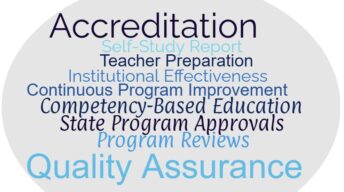Because of the COVID-19 crisis, teacher preparation programs across the nation have been forced to scramble at breakneck speed to shift all their traditional face-to-face coursework to online learning platforms. That includes education methods courses, early field experiences, and even the culminating student teaching clinical experience. Problems are already starting to emerge.
Teacher Preparation Varies from State to State
Each state’s department of education determines what is and isn’t acceptable practice during COVID-19. The American Association of Colleges for Teacher Education (AACTE) continues to work with state legislators to address clinical practice and other teacher licensure requirements during this challenging time; their website provides links to state departments of education that have revised their guidelines. In addition, AACTE maintains a repository of current research, best practice articles, and webinars for teacher preparation program staff.
Some states have been more definitive than others when it comes to guidance for teacher preparation programs. For example, Missouri’s Governor Mike Parson waived the requirements of remaining culminating clinical experiences and internships for the spring 2020 semester. That means student teaching has been taken off the table. He also waived qualifying scores on exit exams, which includes the Performance Assessment (MEES or MPEA) and Content Assessment (MOCA) for candidates currently enrolled in a culminating student teaching or internship experience.
This means Missouri candidates in their last semester won’t have to complete student teaching and they won’t have to pass their culminating exit examinations required for state licensure. Upon graduation, the Missouri Department of Elementary and Secondary Education (DESE) will simply issue teaching certificates to program completers based on the institution’s recommendation.
California’s Commission on Teaching Credentialing (CTC), on the other hand, is holding the line on teacher licensing requirements in its state and provided specific guidance regarding clinical practice for pre-service teachers:

A Real-Life Example: What Absolutely Must Be Avoided
Someone recently sent me a video clip of an elementary education major who is now taking an education methods course online. Her professor assigned her to write a lesson plan and then teach it at home. She then had to record the lesson and submit the video for grading. Bless her heart—this young teacher candidate did her very best and I would award her an “A” for effort, but her “students” were her stuffed animals. She taught the lesson in her bedroom and was trying to teach those critters fractions. She broke them up into small groups and gave them a worksheet.
As she “circulated” around the room, she stopped beside each one and asked them questions or offered words of praise. Our teacher candidate then transitioned back to whole group work after her “students” had completed their worksheet. Shen then continued to demonstrate, question, redirect thinking, and conclude the lesson. Just before turning off the camera, I heard a quiet voice say to herself with a nervous laugh, “I’ve never felt so awkward.”
I couldn’t believe my eyes. I sat in horror as I thought: What a poor way this is to train our future teachers. We know this is a crisis situation and colleges had to scramble quickly to move things online, but come on. Just imagine how ill-prepared this candidate may be for her student teaching. My heart breaks for her and for all those other young teacher candidates out there.
It’s Time to Step Up Your Game, Teacher Preparation Programs.
While it’s still early, some institutions are already signaling that they may stay the course (pun intended) and put all their offerings online again in the fall 2020 semester. Teacher preparation program staff should be working diligently to make sure their candidates receive a quality educational experience in fall 2020 and beyond, despite COVID-19. That includes methods courses, field experiences, and even student teaching. Here’s how:
Tap Into Your Partner Network
Many P-12 schools are also teaching their students online right now and most educator preparation providers have formalized partnership agreements with at least one school district, and in some cases, multiple districts. This allows teacher candidates to complete their field experiences and student teaching in those schools. Why not allow teacher candidates to complete their field experiences or methods lessons online with “real” students? While it may not be ideal, this would be far better than “teaching” stuffed animals.
Build New Partnerships
There are lots of K-12 online schools right now. Many are accredited and authorized to operate in multiple states. Teacher preparation program staff should consider partnering with some of those virtual elementary and secondary schools. If set up correctly, it could be a win-win. Teacher candidates could complete their field experiences with live students regardless of where they live. Practicing teachers could potentially become new graduate students enrolled in a master’s degree program. The teacher preparation program could offer virtual professional development webinars or online conferences. The possibilities are endless.
It’s time to think outside the box because we don’t know what the future will hold. It just, however, can’t include teaching fractions to stuffed animals.
###
About the Author: Dr. Roberta Ross-Fisher has expertise in higher education quality assurance, educator preparation, and competency-based education. A former public school teacher and college administrator, Roberta is now an educational consultant specializing in the Council for the Accreditation of Educator Preparation (CAEP).
Twitter: @RRossFisher
Email: globaleducationalconsulting@gmail.com
Top Graphic Credit: dillydallyfarmingdale.com

